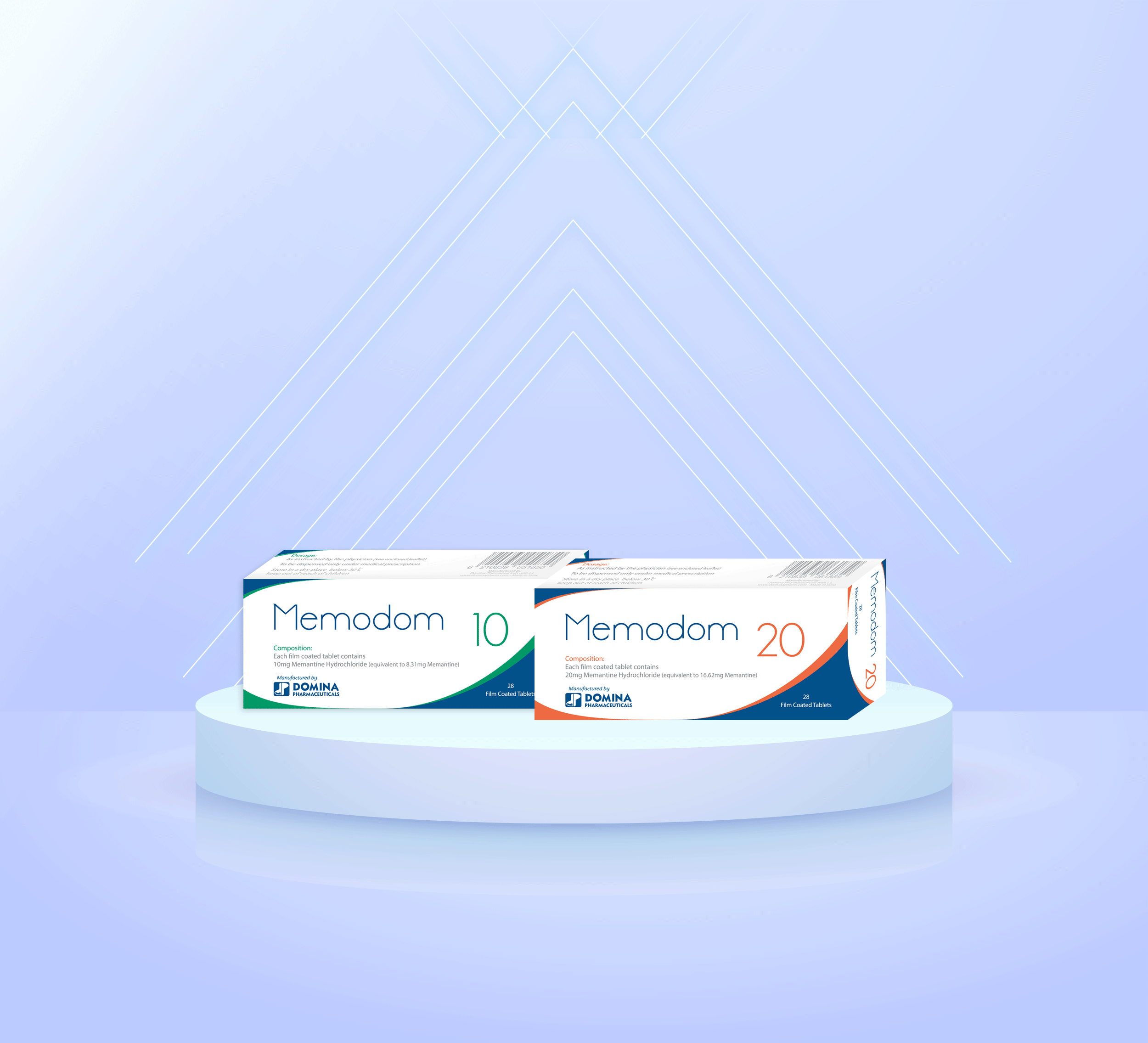
Composition:
Each film coated tablets contains 10 or 20 mg Memantin HCl.
Mechanism of Action:
-Memantine is a voltage-dependent, moderate-affinity uncompetitive NMDA-receptor antagonist.
- It modulates the effects of pathologically elevated tonic levels of glutamate that may lead to neuronal dysfunction.
Pharmacokinetic Properties:
1- Absorption: Memantine has an absolute bioavailability of approximately 100 %. tmax is between 3 and 8 hours. There is no indication
that food influences the absorption of memantine.
2- Distribution: Daily doses of 20 mg lead to steady-state plasma concentrations of memantine ranging from 70-150 ng/ml. The volume of distribution is around 10 l/kg. About 45 % of memantine is bound to plasma-proteins.
3- Elimination: More than 99 % being excreted renally with a terminal t½ of 60-100hours.
The renal elimination rate of memantine under strong alkaline urine conditions may be reduced by a factor of 7-9.
Indications:
Treatment of patients with moderate to severe Alzheimer's disease.
Dosage:
Adults: The recommended starting dose is 5 mg per day which is stepwise increased over the first 4 weeks of treatment reaching the recommended maintenance dose as follows:
- Week 1 (day 1-7): 5mg / day for 7 days.
- Week 2 (day 8-14): 10mg / day for 7 days.
- Week 3 (day 15-21): 15mg / day for 7 days.
- Week 4 (day 22-28): 20mg / day for 7 days.
All dosage take once a day.
The recommended maintenance dose is 20 mg per day.
Elderly: the recommended dose for patients over the age of 65 years is 20 mg per day
Renal impairment:
Mild: no dose adjustment is required.
Moderate: 10mg / day, If tolerated well after at least 7 days of treatment, the dose could be increased up to 20 mg/day
Sever: 10mg / day
Hepatic impairment: mild or moderate hepatic impaired function no dose adjustment is needed.
Children and adolescents: Not recommended for use in children below 18 years.
Side Effects:
Common: Hypersensitivity, Somnolence, Balance disorders, Hypertension, Dyspnoea, Constipation, Headache and Elevated liver function test.
Uncommon: Fungal infections, Hallucinations, Cardiac failure, Vomiting and Fatigue.
Contraindications:
Hypersensitivity to the active substance or to any of the excipients.
Precautions:
- Caution is recommended in patients with epilepsy, former history of convulsions or patients with predisposing factors for epilepsy.
- Some factors that may raise urine pH may necessitate careful monitoring of the patient.
- Patients with recent myocardial infarction, uncompensated congestive heart failure or uncontrolled hypertension; these conditions should be closely supervised.
Drug Interactions:
- The mode of action suggests that the effects of L-dopa, Dopaminergic agonists, and anticholinergics may be enhanced by concomitant treatment with memantine
- Concomitant use of memantine and amantadine should be avoided, owing to the risk of pharmacotoxic psychosis.
- Other active substances such as cimetidine, ranitidine, procainamide, quinidine, quinine and nicotine that use the same renal cationic transport system as amantadine may also possibly interact with memantine leading to a potential risk of increased plasma levels.
- There may be a possibility of reduced serum level of hydrochlorothiazide when memantine is co-administered with HCT or any combination with HCT.
Overdosage :
Only limited experience with overdose is available from clinical studies and post-marketing experience.
Symptoms:
Relative large overdoses (200 mg and 105 mg/day for 3 days, respectively) have been associated with either onlysymptoms of tiredness, weakness and/or diarrhoea or no symptoms. In the overdose cases below 140 mg or unknowndose the patients revealed symptoms from central nervous system (confusion, drowsiness, somnolence, vertigo,agitation, aggression, hallucination, and gait disturbance) and/or of gastrointestinal origin (vomiting and diarrhoea).In the most extreme case of overdose, the patient survived the oral intake of a total of 2000 mg memantine with effectson the central nervous system (coma for 10 days, and later diplopia and agitation).
Treatment:
In the event of overdose, treatment should be symptomatic. No specific antidote for intoxication or overdose is available. Standard clinical procedures to remove active substance material, e.g. gastric lavage, carbo medicinal is (interruption of potential entero-hepatic recirculation), acidification of urine, forced diuresis should be used as appropriate. In case of signs and symptoms of general central nervous system (CNS) overstimulation, careful symptomatic clinical treatment should be considered.
Use in Pregnancy or Lactation:
- Memantine should not be used during pregnancy unless clearly necessary.
- Women taking memantine should not breast-feed.